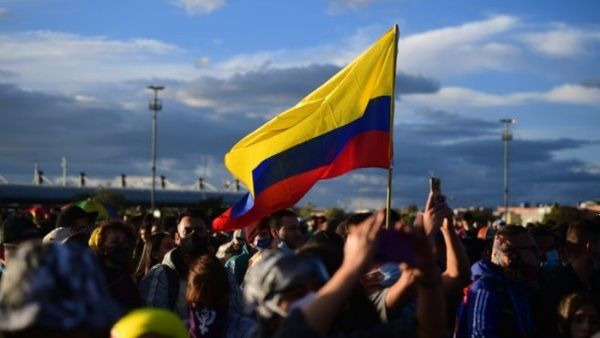
The mobilizations on July 20 coincide with the beginning of a new legislative period. | Photo: EFE
Bogota, July 20 (RHC)-- Trade union organizations, social and popular sectors that make up the National Strike Committee (CNP) mobilized this Tuesday in the main cities of Colombia in a new day of protests against the government of Iván Duque.
The mobilizations on July 20th coincided with the commemoration of the country's independence from the Spanish crown and the beginning of a new legislative period. In Bogota, representatives of the CNP expect to deliver to Colombian legislators at least ten bills collectively constructed by the members of the committee.
The proposals delivered to Congress summarize the claims and demands that motivated the mobilizations of 2020 and 2021 that the administration of President Iván Duque has refused to negotiate and discuss.
In this sense, the proposals of the CNP refer to police reform, guaranteed right to protest, tax system, economic reactivation of SMEs, employment generation, actions against gender-based violence, among other demands.
Through social networks, Colombians have been invited to demonstrate with helmets, masks and shields to protect themselves from repression by the Mobile Anti-Riot Squad (Esmad), which has been blamed for numerous human rights violations.
The Colombian Minister of Defense, Diego Molano, warned that they will not allow blockades, violence or permanent encampments and will deploy, in this capital alone, more than 6,000 police agents and 2,700 military personnel.
On July 17, the Security Council of the United Nations Organization (UN) regretted the violence that occurred during the National Strike, which began on April 28th, and called for the respect of human rights and the solution of the problem through dialogue.
So far, the protests of the National Strike have caused the death of more than 80 people. They also expressed their concern for the violence in Colombia and "the persistent threats, attacks and assassinations against community and social leaders".
They also expressed concern about the murders of social and human rights leaders, as well as former members of the Revolutionary Armed Forces of Colombia-People's Army (FARC-EP) who laid down their arms as participants in the peace process.

